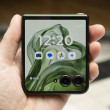Android

Created by Google, Android is a smartphone OS and platform that is open-source and open for any manufacturer to use to make a smartphone. Most Android phones use a version that is mostly provided by Google and requires Google services. Android phones can run Android apps, available from the Google Play Store, or, optionally, from other sources.
by: Google
Spectrum and Xfinity Launch Satellite SOS and Messaging
Spectrum Mobile and Xfinity Mobile have both launched emergency messaging via satellite for the Samsung Galaxy S25 series and Google Pixel 9 series Android phones. In the coming weeks, they will also launch non-emergency text messaging via satellite. The service offers basic connectivity in cellular dead zones, and uses the NTN satellite feature of those specific phones. Both Spectrum and Xfinity use Verizon's network, and Verizon enabled non-emergency satellite messaging just yesterday. All three companies rely on Skylo to provide this satellite service. NTN is an industry standard and specific technology found only in some phones, that lets a phone communicate directly with existing satellite networks, much like Apple's proprietary satellite features on iPhone. Other satellite services for phones (Starlink and AST SpaceMobile) offer greater phone compatibility, but require new satellites to be launched.
Apple Pledges to Support Encryption in New RCS Standard
The RCS industry standard for enhanced messaging has been updated to officially support standardized End-to-End Encryption (E2EE). Further, Apple has committed to support it in future implementations of RCS in iOS. This will greatly improve the security and privacy of cross-platform messaging between iPhones and Android phones. Google launched its own implementation of E2EE for RCS in 2020, but the feature was not officially part of the RCS standard until now, with GSMA's RCS Universal Profile 3.0. That is why Google's E2EE feature only worked when both parties were using Google's Messages app. Now, this standardized version of E2EE should enable it for more RCS conversations. Apple has not committed to a specific timeline for adding E2EE to RCS.

Android Gaining Support for Auracast with Newer Bluetooth Hearing Aids
The newest beta version of Android introduces a new feature that lets certain supported phones — such as the Pixel 9 series — use Auracast with Bluetooth hearing aids that support it. Auracast is a broadcast audio technology that lets many Bluetooth audio devices (such as earbuds and hearing aids) tune in to the same audio source at one time. The technology is starting to roll out in places like train stations, theaters, and gyms. Auracast is an optional part of LE Audio, the new Bluetooth audio standard. Samsung has also enabled Auracast for compatible hearing aids with its One UI 7 software on Galaxy devices. Google is also adding a feature to Pixel phones that lets users tune in to a specific local Auracast stream by a scanning a QR code. Last year, Google added Auracast info to Google Maps, to help people find nearby locations that offer the technology.
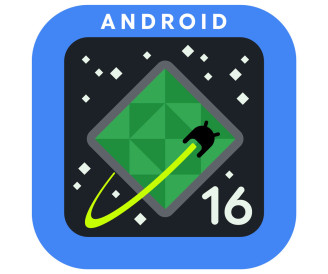
Android 16 Hits Critical Milestone Toward Release
The third public beta version of Android 16 is available now, and brings "platform stability", which means developers can begin finalizing and releasing apps that are specifically designed to be compatible with Android 16. The final version of Android 16 is expected as soon as May.
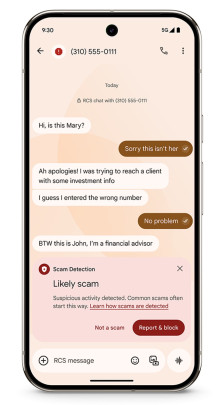
Advanced AI Scam Detection Comes to Google Messages
Google is enhancing its Messages app (the default Android app for RCS and SMS) with on-device AI to detect scam conversations and alert users. While the app already detects obvious spam and up-front scams, the new feature tracks ongoing conversations that may seem to have started as innocent conversations, but then turn to the scam phase. The feature is the result of Google partnering with financial institutions around the world to understand how the newest scams work.
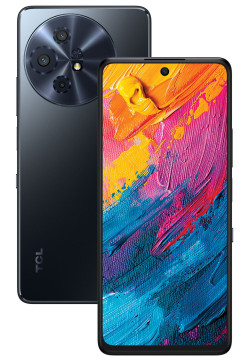
TCL Gives More Detail on 60 XE NXTPAPER 5G
First teased at CES, TCL's next NXTPAPER phone for the US now has more confirmed specs. We now know that it will be powered by a MediaTek Dimensity 6100+ chipset, and have expandable storage plus a 3.5mm headphone jack. The US version will come with more memory than the Canadian version: 8 GB RAM and 256 GB storage. It will have a 5,010 mAh battery and come with an 18W charger. Also on board are NFC, a fingerprint reader, Bluetooth 5.3, and Android 15. Back in January, TCL revealed that the phone would have a large 6.78" display with FHD+ resolution and 120 Hz refresh. As a NXTPAPER phone, the display has a unique matte finish and a special "e-paper" mode, which on this model can be activated with a dedicated switch on the side. We also knew that that the main camera would be 50 megapixel and the front camera 32 megapixel. Now we know that the other cameras are a 5 megapixel wide-angle cam and a depth camera for portrait mode. The 60 XE is slated to come to Canada this spring, and the US soon after.
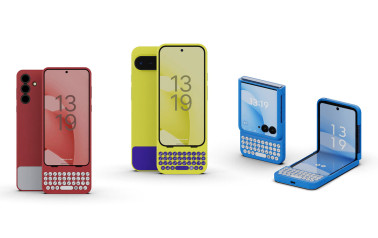
Clicks Keyboard Case Comes to Android
Clicks, the phone case that adds a physical QWERTY keyboard to the bottom of your phone, is expanding to offer models for several popular models of Android phones. (Clicks was previously only available for iPhones.) The new case models are for the Samsung Galaxy S25, Google Pixel 9 and 9 Pro, and the Motorola razr+. While all models expand screen real estate by moving the keyboard off the display, this benefit is perhaps most acute for the outer display of the Motorola razr+. Each is available in "Onyx" black or another bright color (Pinot red for Samsung, Surge yellow for Google, and Electric blue for Motorola). All three are available for $99 in special pre-order pricing until March 21st ($139 after that date). Expected shipping dates vary by model, ranging from April 30 for the Google version to "after June" for the Pinot color for Samsung.
Amazon Ditching Appstore for Android
Amazon has announced that it is killing off its Appstore on Android as of August 20, 2025. After after that date, apps purchased from the Amazon Appstore on Android may no longer function. The Appstore could be side-loaded onto Android devices and offered an alternative to Google's Play app store. The Amazon Appstore was also the primary source of apps for Microsoft's Windows Subsystem for Android (WSA), which enabled Windows 11 devices to run Android apps. Microsoft is ending support for WSA on March 5, 2025.
Apple Brings Apple TV+ to Android
Apple has launched an Android version of its Apple TV app, allowing people to watch the Apple TV+ and MLS Season Pass streaming services on their Android device. Apple TV+ includes Apple original TV shows like Severance, Slow Horses, Masters of the Air, and Ted Lasso, as well as original films like Wolfs and Killers of the Flower Moon. MLS Season Pass streams every Major League Soccer match, for all 30 clubs, with no blackouts. Apple TV is available now from the Google Play app store.
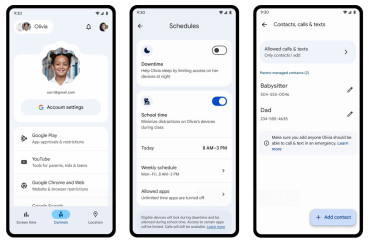
Google Makes Useful Parental Controls Part of Android
Google has announced a major update to its Family Link service that adds "School Time" and parent-managed contacts for Android phones. This brings Family Link much closer to a complete service for parents, that previously would have required a third-party Android device with specialized software, such as a Pinwheel or Bark phone. School Time lets parents set a schedule for extra restrictions during school hours to reduce distractions, with custom exceptions for apps that may be useful at school. Family Link also lets parents manage screen time, apps, web sites, and videos. It also includes location tracking. While Family Link can manage kids' "supervised" Google accounts, Google also announced a new AI-powered system that will attempt to guess the age of any Google account holder. This will enable Google to deliver an age-appropriate experience even for accounts that kids create on their own.
The First Beta Version of Android 16 is Here
Google has released the first test version of Android 16 for curious early adopters and developers. One of the biggest new features is Live Updates, intended to "help users monitor and quickly access important ongoing activities", specifically, "progress-centric user journeys: rideshare, delivery, and navigation." Android 16 also introduces support for the Advanced Professional Video (APV) codec, which offers "professional level" video capture features. Another major change is requiring apps to adapt their layouts to larger screens when used on foldables and tablets. Developers can still opt-out in some cases, but will not be able to opt out in the next major release, in 2026. This release of Android will be the biggest update of 2025, and is slated for final public release some time after April (possibly in May, if testing goes well). Google also plans Android updates in every other quarter of the year, with the fourth quarter update bringing new APIs and features, and the first- and third-quarter updates being smaller "features only" updates. Google cautions that Android 16 is still in active development and the beta is not recommended for anyone's primary phone. Anyone with an eligible Pixel device can enroll in the beta program, but it is not possible to switch back to Android 15 without completely wiping the device and erasing all data.
Galaxy S25 Series Supports Satellite SOS, But Only on Verizon
As previously announced by Verizon, the new Samsung Galaxy S25 series will support NTN satellite SOS service in remote areas of the US without land-based cellular service. The service works similarly to Apple's "Emergency SOS via satellite" feature. Verizon notes that the service "might not work in parts of Alaska". Verizon has partnered with Skylo to offer this service. Google's Pixel 9 series of phones also supports this technology and Verizon will provide it for those phones as well, bringing its flagship Android phones up to par with iPhones in this aspect. Unlike Google, Samsung has not announced plans to enable this service for non-Verizon customers. Verizon is also working with AST SpaceMobile to being satellite connectivity to all existing phones, but AST's service may not be fully operational until the end of 2026. Therefore this service from Verizon brings similar functionality to at least some of its Android phones now.
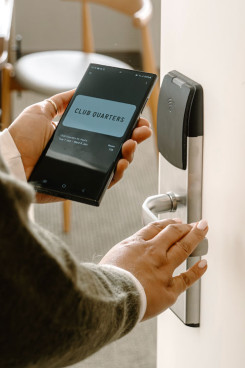
Club Quarters Hotels Support Digital Room Keys on any Smartphone
Club Quarters has completed rolling out digital room keys across all of its hotel locations, with a solution that supports mobile wallets on both Apple iPhones and Google Android phones. This marks a first in the hotel industry. Club Quarters first rolled out digital room keys via its own app in 2017. Now, "arriving guests can easily receive their room key by downloading it from their check-in confirmation email and adding it to a digital wallet on their Apple or Android device." Digital room keys are automatically activated during online check-in, and automatically updated if a guest extends their stay. They also provide access to property amenities like the fitness center. Club Quarters' implementation is compatible with Express Mode and Power Reserve on iPhone, so the digital room key will continue to work for up to five hours after a phone has turned "off" due to low battery. Hyatt started rolling out digital room keys for iPhones in late 2021.
Qi2 Wireless Charging Gains Momentum with Samsung Adoption, New Features
The Wireless Power Consortium (WPC) provided a status update on the Qi2 wireless charging standard. Samsung has committed to including Qi2 in Samsung Galaxy Android devices in 2025. Android phone makers have previously been slow to adopt the standard. Apple iPhones include Qi2, which is based on a combination of the original Qi and Apple's MagSafe. Qi2 uses magnets for better alignment, and supports faster 15-watt charging. WPC announced that Qi v2.1 will include a "Qi2 Ready" designation for phones and phone cases. When a Qi2 Ready phone is used with its corresponding Qi2 Ready case, the combination will fully support Qi2. The Qi v2.1 specification will also include support for a moving coil in automotive applications. Instead of relying on magnets for alignment, the coil built into the car would physically move as it "looks for the phone's exact location, so it can lock in a perfect connection every time". WPC also mentioned Qi v2.2, which will include "high-power wireless charging technology" contributed by Google. Google says it "is committed to the Qi2 wireless charging standard and increasing the penetration of Qi2 into Android handsets", but stopped short of promising to include the tech in its own Pixel phones this year.

The Motorola/Bullitt Satellite Dongle is Now the HMD Offgrid
Following the collapse of Bullitt a year ago, HMD has picked up the rights to the Motorola Defy Satellite Link, and will release a tweaked version called the HMD Offgrid. The small Bluetooth device gives any Android or iPhone satellite connectivity where cellular service isn't available. HMD claims to have enhanced the service with better coverage, better plans, and new enterprise features. They also redesigned the SOS button to reduce accidental presses. The basic functions are otherwise similar. It can automatically share live location data with up to five contacts. Its messaging function works from the dedicated app, but you can text any phone number, and messages you send come from your phone number. It can be configured to share location at intervals from every three minutes to four hours. With 30 minute intervals, the 600 mAh battery can last at least three days. The device is rated IP68 and military-grade rugged. In the US, service is available up to 70 miles from shore (coverage includes Hawaii and Alaska). The Offgrid connects to the Viasat network through a partnership with Skylo. Focus Point handles SOS response, and they have partnered with Overwatch X for rescue operations when necessary (at no additional charge). The device goes on sale this month for $199 from hmd.com. Service plans start at $80/year for the "Freedom" plan which includes unlimited manual check-ins and 350 messages. Live tracking costs 10¢ per ping. A higher-end "Unlimited" plan runs $15/month for unlimited messages, check-ins, and SOS services. Live tracking can be added to that plan for $5/month. Activation fees may also apply.

Samsung Intros Entry-Level Phone for 2025: the Galaxy A16 5G
Samsung has announced the Galaxy A16 5G, the company's primary entry-level 5G model for the year, retailing for $200. The phone launches in one week, on January 9th. Key improvements compared to the A15 it replaces include a larger display (6.7" FHD+ AMOLED instead of 6.5"), and IP54 dust/splash resistance rating. It also switches to a Samsung Exynos 1330 processor chip instead of a MediaTek chip. Other specs remain similar, including a 5,000 mAh battery with 25W fast charging, 50 megapixel main camera, 5 megapixel wide camera, 13 megapixel front camera, 4 GB RAM, 128 GB storage (expandable), and NFC. The A16 comes with Android 14 and a promise of 6 generations of OS upgrades and 6 years of security updates. The A15 was offered by nearly every wireless carrier in the US, and the A16 is expected to receive similarly wide distribution. Samsung offers two color choices: Blue Black and Light Gray. For a limited time, Samsung is offering 50% off the new Galaxy Fit3 fitness tracker (normally $60) when you purchase both devices together from samsung.com.
Android Gains More Robust Protection Against Unknown Bluetooth Trackers
Google today announced three new upgrades to help Android users deal with unknown Bluetooth tracking devices (potentially used for stalking and other surreptitious location tracking.) Both Android and iOS will detect an unknown Bluetooth tracking device making the same movements as a phone, and show an "unknown tracker" alert to the user. This detection is now cross-platform, thanks to a multi-year effort by Google and Apple. Recently, Google tweaked this technology to make these alerts happen "faster and more often." Second, Find Nearby now works with unknown trackers, to interactively help you pinpoint the tracking device quickly and precisely. Previously, users could only see its general location on a map and make it play a sound. Apple made similar changes to iOS in 2022. Finally, a new option lets users "Temporarily Pause Location" on your phone for up to 24 hours. Since Bluetooth trackers rely on other nearby Bluetooth devices — like your own phone — to track location, this prevents your own phone from being used against you, until you can find and disable the unwanted tracking device.
Google Reveals New Features in December's Pixel Feature Drop
Google's December software update for Pixel devices includes a long list of small new features. You can now ask Gemini Advanced to remember things about you to improve its responses. This "saved info" feature can remember things like if you're a vegetarian. Foldable devices now support Dual Screen, which puts the real-time viewfinder on both displays at the same time. The relatively new Pixel Screenshots app now automatically categorizes your screenshots and lets you apply filters when searching. It also adds new suggested actions, Like creating a calendar invite, getting directions, or adding a ticket to Google Wallet. The Recorder app has a new "Clear voice" option that reduces background noise. A new Simple View mode "increases your phone’s font size and touch sensitivity, making it easier to see and use controls, apps and widgets." A new Identity Check anti-theft feature automatically requires biometric authentication to change sensitive settings when it detects that you're in a new location. Other features and apps getting minor improvements include Gboard, Gemini Live, Call Screen, Made You Look, Emoji Kitchen, Circle to Search, Now Playing, Instagram, and Snapchat. Google also announced several new features coming to both Pixel and non-Pixel Android devices this month.

Google Announces Several New Android Features
Google is rolling out multiple new or enhanced features for Android outside of the version-number update cycle. While many involve Google's Gemini AI, the features address disparate functionality.
- Expressive Captions is a major update to the existing Live Caption feature of Android. It adds emotion, nuance, and context to captions. Human noises like sighing, grunting, and gasping will now be spelled out. Emphasis will be noted in all-caps. Finally, ambient sounds like applause will be noted. Live Caption works at the OS level, across all apps that output sound.
- Quick Share now supports fast connections between phones using just QR codes. This eliminates the need to add the other person as a contact, verify devices, or change sharing settings, just to send a file to a nearby device.
- Google Drive can now auto-enhance document scans. When using your phone's camera to add a new file to Drive, the enhance button will now detect things like documents, receipts, ID cards, and automatically straighten, improve contrast and white balance, and remove shadows and blurring. You can then save in the format of your choice, such as PDF.
- Google is also adding new Extensions to Gemini that link to more functionality across apps. This includes calling and messaging your contacts, setting alarms, changing phone settings, using the camera, and controlling Spotify. Soon, you'll also be able to use Gemini to control smart home devices, and get more information about places on Maps.

Sonim XP Pro is a Sleeker Rugged Phone
Sonim and Verizon have launched the Sonim XP Pro 5G, a new rugged smartphone that's significantly slimmer and sleeker than Sonim's previous models. The $550 phone is rated IP68 and IPX9K1 for water and dust. It also meets military durability standards for temperature/humidity, thermal shock, mechanical shock/drop/vibration, water, and solar radiation. It also carries non-incendive ratings for environments where flammability is concern. Like most Sonim phones, it comes with a robust accessory ecosystem, including rugged headsets, vehicle kits, multi-bay chargers, and more. A loud dual-speaker system offers 100+ dB of volume for clear sound in loud environments. The phone sports two customizable shortcut buttons that can be assigned to functions like PTT and SOS. It also comes with a 3-year warranty, and Sonim promises OS updates through Android 16. For customers with supply chain / national security concerns, the XP Pro is manufactured in Taiwan. The XP Pro supports Verizon's "Ultra Wideband" mmWave 5G. The 6.6 FHD+ display is protected by Gorilla Glass Victus II and works with gloves. The phone is powered by a Qualcomm Snapdragon 7 Gen 3 chipset with 8 GB of RAM and 256 GB storage (expandable by up to 2 TB). It has a 5,000 mAh battery and support both wireless charging and fast charging. It has a 50 megapixel main camera and 13 megapixel wide-angle camera. It supports Wi-Fi 6E, NFC, and fingerprint security. The Sonim XP Pro 5G is available from Verizon starting today for $550.
Department of Justice Seeks to Separate Chrome and Google Search from Android
The Department of Justice has officially requested that Google sell off its Chrome web browser and stop making Google the default search engine in web browsers and on phones, including both Android phones and iPhones. The request is the DoJ's proposed remedy in an ongoing federal anti-trust case in which the court has already found Google guilty of maintaining an abusive monopoly. Google would further be barred from favoring its own services — such as its Gemini AI and YouTube — in Android. The DoJ also wants Google to be required to sell off its Android OS "if its oversight committee continues to see evidence of misconduct." Google responded that the proposal pushes "a radical interventionist agenda that would harm Americans and America’s global technology leadership." Google points out that barring deals for Google Search placement in web browsers would actually hurt browser competition, as Mozilla's Firefox browser is financially dependent on its deal with Google.
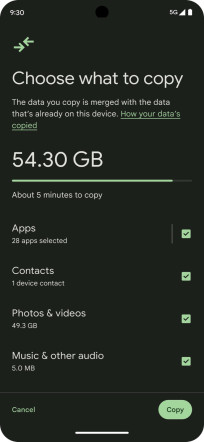
Google Makes it Easier, Faster to Set Up a new Android Phone
Google today announced a number of new features and updates that improve the experience of setting up a new Android device, particularly around moving apps and data from your old device, be it and iPhone or Android phone. Previously exclusive to Pixel devices, several different Android manufacturers now include or support Android Switch, Google's app that guides you step-by-step through setting up a new device and transferring your data. Wireless transfer is supported, but more types of data can be transferred from an iPhone when using a cable. Further, Google has made cable transfers from iPhone 40% faster. Google is also starting to roll out the option to run Android Switch after the initial setup process. This option is currently available on the Pixel 9 series, but is "coming to more Android phone makers in 2025". Finally, Google is rolling out a Restore Credentials feature that lets app logins transfer seamlessly when upgrading from one Android device to another. This will mean individual apps should no longer require you to log in again when setting up a new device.
Google Accelerating New Android Versions
Google is changing its Android release schedule, releasing more new versions, sooner. While Google has stuck to a relatively consistent annual schedule in recent years, with Android 15 having just been released, the next major version — Android 16 — is now planned for the second quarter of next year. Google says this earlier release date is "to better align with the schedule of device launches across our ecosystem, so more devices can get the major release of Android sooner." Another, more minor, update is also planned for the fourth quarter of next year. The "major" update will bring API and behavior changes that typically come with a whole new version of Android, requiring all developers to test their apps for issues. The new "minor" update could introduce new features and APIs, but should not break any existing apps. With this new schedule, Google says to expect the first developer preview of Android 16 soon.
Google Wallet for Kids Coming in 2025
Google has confirmed that it plans to roll out a special version of Google Wallet for kids next year. The Android app will support tap payments in person, but not online transactions. It will also support gift cards and event tickets, but not ID cards. It will require that the Android device be enrolled in Family Link, Google's parental control solution. Via Family Link, parents will be able to add and remove payment cards, as well as view transactions. Google already offers a version of this for its Fitbit Ace LTE smartwatch, but it will now expand to Android phones.
Google Working on "Rich Ongoing Notifications" for Android
Recent beta versions of Android include the first bits of a new API for app developers called Rich Ongoing Notifications. It appears to let developers put an icon plus small bit of updating text directly in the status bar, similar to the "chip" that is displayed in the status bar during a phone call. The feature would therefore be similar to the Live Activities feature that Apple introduced in iOS with its Dynamic Island concept. The feature may be slated for Android 16. Android 15 was just released.

Chrome on Android to Play Nicer with Third-Party Password Managers
Google is improving how its Chrome web browser on Android integrates with third-party auto-fill services such as password managers. Currently, such software must use a "compatibility mode" in Chrome that can be glitchy and is being phased out. Starting in Chrome version 131, a new "Autofill services" setting will let users choose a third-party service. Chrome 131 is scheduled to be released November 12, with a beta version already available. Users will have to manually choose a third-party autofill service in system settings (if they haven't already done so), then choose "Autofill using another service" in Chrome settings. Chrome will then use whatever service was chosen in the system settings. Google recommends that third-party password manager apps show a prompt to users, to inform them of these steps they need to take. Google plans to phase out Chrome's "compatibility mode" sometime in "early 2025".

Android 15 Exits Beta, Starts Rolling Out
Android 15 is finally, officially launching, starting today with Pixel devices. This version had an unusually long beta testing period. Among many new features, the biggest may be a suite of new anti-theft features. Most interesting is Theft Detection Lock, which uses AI and the phone's sensors to detect when a phone may have been snatched and automatically lock it. Google has also added "authentication requirements for settings targeted by thieves, like removing your SIM or turning off Find My Device, and will lock down your device if we sense multiple failed attempts for apps and settings." These features are not necessarily on by default, often needing to be activated manually in Settings. Android 15 also brings "Private Space", a place to hide sensitive apps behind an additional layer of authentication. Finally, Android 15 brings a standardized way for carrier messaging apps to send and receive messages via satellite. Android 15 should come to Samsung and other Android phone brands in the coming months. Google is also using the Android 15 update for Pixel phones to do a new "Feature Drop" with new Pixel-exclusive features. This includes Audio Magic Eraser, to clean up audio in your captured videos. The camera app gains a new Underwater mode, to capture better colors underwater. Finally, the Pixel Weather app now includes a three-part pollen tracker for seasonal allergies.

Google Now Lets You Search with Camera + Voice
Google has enhanced its Google Lens feature on mobile to support voice queries while doing a visual search with your phone's camera. On both iOS and Android, you can now ask Google questions like "why did the artist paint this?" or "what kind of clouds are these?", using your voice, while pointing your phone's camera at a painting or the sky, for example. To access the feature, open the Google (search) app, tap the camera (Google Lens) icon, aim, and hold down the shutter button while speaking. The feature can also be accessed from the dedicated Google Lens app, or anywhere else a Google Lens icon appears, such as in camera apps or home screen widgets.

Pebblebee's New Trackers Work with Both Apple and Google Find My Networks
Peeblebee has launched a new lineup of "Universal" Bluetooth item-tracking tags that are the first to be compatible with both Apple Find My and Google's Android Find My Device networks. The $35 tags are rechargeable and come in three form factors: Tag, Card, and Clip. The rectangular Tag is the smallest. The round Clip has a lanyard hole ideal for attaching to keys and bags. The Card is 2.8mm thin to fit into wallets and laptop sleeves. The Clip can charge directly via USB-C, while the Card and Tag come with a magnetic charger. The Tag lasts 8 months on a single charge, while the Clip lasts 12, and the Card, 18. All include a buzzer and lights to aid finding when lost, and are rated IPx6 for water resistance. Both the Apple and Google networks work similarly, by leveraging Bluetooth of smartphones and other connected devices worldwide. Encryption and anonymization ensures privacy and security. Cross-platform anti-stalking features help guard against unwanted tracking.
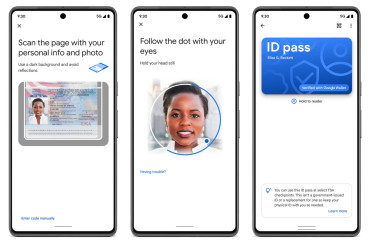
Google, TSA Testing New "ID Pass" in Wallet, Created by Scanning Passport
Google will soon start beta testing a new type of digital ID in Google Wallet. This "ID Pass" serves the same function as a digital driver's license (mID) at TSA airport security checkpoints and potentially other places where you need to verify your identity. In this case, it's created by scanning your passport (the photo page and chip) with your phone, then scanning your face to confirm it's you. This creates an "ID Pass" that will be accepted at TSA checkpoints that already take mID. The TSA has a web site that lets you check which airports accept digital IDs before you travel. Importantly, an ID Pass is not a digital passport, and Google still recommends carrying a physical ID. Google also shared that Iowa, New Mexico, and Ohio will be the next US states to enable mID in Google Wallet.
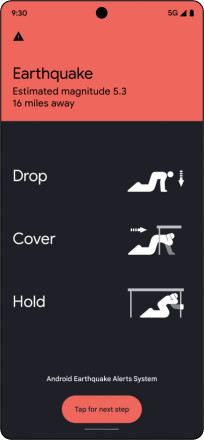
Google Expands Earthquake Alerts Nationwide
Google has released a new version of Android 14 today that brings several new features alongside the usual security updates. One is the expansion of the Android Earthquake Alerts System to all all 50 US states and six territories. The system automatically crowd-sources data using the built-in accelerometers in Android phones. It can then provide alerts to users when there's an earthquake, sometimes seconds before noticeable shaking starts. This can give users precious time to get to safety, such as a doorframe. On phones that can run the newest version of Gemini Nano — currently just the Pixel 9 series — the TalkBack screen reader can now use AI to describe on-screen images in detail. Finally, Google has added the ability to identify songs by audio to Circle To Search.
Verizon Launching Satellite Service for Android Phones That Support NTN
Verizon has announced a new satellite connectivity service that will offer SOS and location-sharing features in cellular dead zones with compatible Android phones starting this fall. Non-emergency messaging will launch next year. The first compatible Android devices (using the 3GPP rel. 17 NB-NTN standard) are the new Pixel 9 series from Google and "upcoming Galaxy devices" from Samsung. Verizon is partnering with Skylo to offer the service. Skylo's service works similarly to Apple's "Emergency SOS via satellite" feature, and will bring Samsung (and Google) phones up to parity with iPhones in Verizon's lineup. Verizon also has a partnership (and investment stake) with AST SpaceMobile, which will offer similar functionality that works with existing phones. However that service is not available yet because more new satellites must be launched (literally) before it's ready for consumers. This new, Skylo-based service allows Verizon to offer satellite connectivity — for compatible phones — sooner. This service requires specific hardware support in the phone, including an NTN modem and L-band antenna. Qualcomm's upcoming X80 modem includes NTN support and is expected to appear in the next wave of flagship Android phones. MediaTek also offers chips that support NTN. While the Pixel 9 series comes with satellite service from Google, Verizon says it is "working towards a plan to move Pixel 9 to Verizon" satellite service. Both T-Mobile and AT&T seem to be skipping NTN and relying on future systems that require new satellites but will work with existing phones; AT&T is also partnering with AST, while T-Mobile is working with SpaceX Starlink.
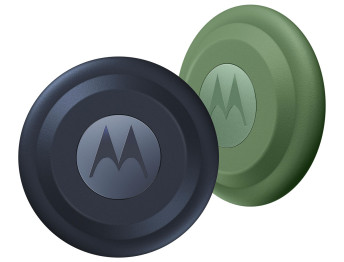
Moto Tags Now Available
Motorola's new Moto Tags go on sale starting today, available from motorola.com and amazon.com. Moto Tags use the new, Bluetooth-based Google Find My Device network and include UWB for short-range, precision location. Moto Tags are similar to Apple AirTags and work with most Android phones. They also support cross-platform protections against unwanted tracking (stalking). Moto Tags are rated IP67 for dust and water, and use the same CR2032 battery as AirTags, designed to last one year. Moto Tags have a button, which can be used to ring a lost phone, or trigger your phone's camera. Moto tags sell for $30 each, or $100 for four. Chipolo and Pebblebee also make tags compatible with the new Google Find My Device network.
Google Bringing "School Time" Parental Controls to Android
Google today announced that its Family Link parental controls for Android devices will soon gain a School Time feature. "School time enables parents to set their child's personal device to a dedicated home screen with limited functionality during school hours". Parents can also schedule and select which apps are allowed [and] allow calls or texts from specific contacts." Google promises to bring School Time to "select Android phones, tablets and Samsung Galaxy Watches" over the next year.
New Windows Feature Mounts Your Android Phone Like a Disk
Microsoft has released a new beta version of its Link to Windows app for Windows 11. This version comes with a new feature that lets you automatically display your Android phone's files directly in the Windows File Explorer, just like any connected disk/drive. The feature works wirelessly, over Bluetooth. It provides full file access, such as move/copy, rename, and delete. The feature does require some setup within the settings of the Link to Windows app. Although it's in beta now, this version of Link to Windows is already part of Microsoft's "Release Preview" channel, indicating it should be finalized and released for all Windows 11 users soon.
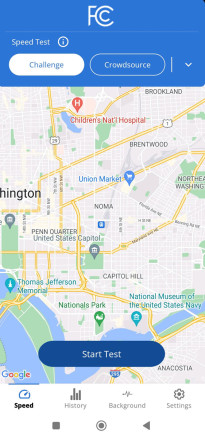
FCC Revamps its Mobile Speed Test app
The FCC has launched a new mobile app for consumers to test the data performance of mobile networks themselves and contribute to the FCC's database of real-world mobile broadband speeds by area. Unlike the old app, the new FCC Mobile Speed Test app has a "Repeated test" function that lets users enter their info once for a series of tests, including hands-free mobile tests while driving. Users can also now review their own speed test data on a map. Data contributed to the database can help other consumers choose the best network in their area based on real-world performance. Challenge mode lets consumers challenge provider-reported coverage with the FCC using real-world tests. Aggregate data collected using Crowdsource mode is "used to inform the Commission's verification and audit work, as well as other policy decisions." Finally, a Background Test mode lets users schedule automatic tests on a regular basis in the background, on a schedule of their choosing. The free app is available now for Android and iOS.
Android Gains Support for Thread
Android 15 will include support for phones with a built-in Thread radio for connecting directly to Matter smart-home devices. No such Android phones yet exist, but the iPhone 15 Pro and 15 pro Max include Thread radios for the first time. A typical Matter smart-home network today consists of smart devices with Thread radios and a Matter "hub" or "border router" that connects the Thread mesh network to Wi-Fi and the Internet. Today, smartphones control a Matter smart-home via Wi-Fi and the Matter hub. But a phone with a Thread radio would be able to connect directly to Matter devices like smart switches and smart light bulbs. This might enable faster setup, or perhaps improve day-to-day reliability by giving the phone two ways to connect to a device when controlling it locally. Matter is the relatively new industry standard for smart-home networks and devices, embraced by both Google and Apple, and designed to replace proprietary solutions.
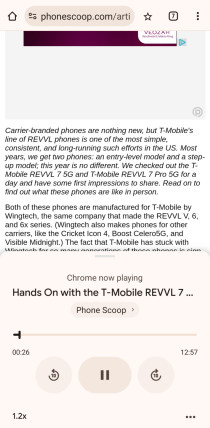
Chrome Adds "Listen to this page"
Google's Chrome web browser for Android has quietly added a new feature that will read a web page aloud. On pages where it makes sense, the main options menu now has a "Listen to this page" option. This brings up a basic audio playback interface at the bottom, which can be expanded to show more options. A scroll bar lets you skip around. Two buttons let you skip 10 seconds back or ahead. You can also choose from several different voices and set playback speed from 0.5x to 4x. By default, it highlights what it's reading and auto-scrolls so you can follow along visually, but this can be disabled.
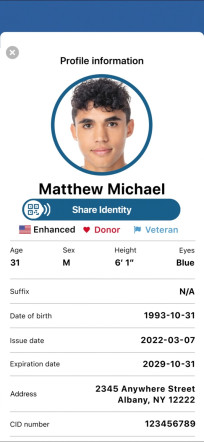
New York State Launches Mobile ID App
New York is newest US state to offer an official, standards-compliant mobile ID (MiD). The new New York Mobile ID app is available for both Android and iOS. The dedicated app is required for both setup and use; New York's solution is not yet compatible with Apple Wallet nor Google Wallet. During setup, the user scans both their physical ID card and face. The app can then display a personalized QR code any time identity and/or age need to be verified. The code is scanned by the person requesting verification using any standard-compliant verification app. They then choose what information to request, the ID holder gives permission on their device, then the requested information (and that info only) is transmitted wirelessly and automatically verified with the NY DMV. The ID holder does not need to hand over their phone at any time. The verifying device must have an internet connection, but the device of the ID holder can be offline. The TSA currently accepts mobile ID at 28 airports, including all terminals of JFK and LaGuardia in New York City. Businesses that need to check ID can start accepting mobile ID at any time, but verification apps are not yet in widespread use. New York's app is similar to that of California, Delaware, Iowa, Louisiana, Mississippi, Utah, and Virginia. States with mobile IDs that can also be added to mobile wallets are currently: Arizona, Colorado, Georgia, and Maryland.
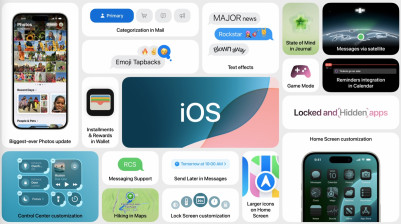
iOS 18 Overhauls Home Screen, Messaging, Photos
Apple just announced iOS 18 for iPhones. The update will bring a slew of new features, with the biggest changes coming to home screen icons, messaging, and the Photos app. You'll now be able to put app icons anywhere, even at the bottom of the screen. Icons also have a special dark mode appearance, and a monochrome appearance that lets you customize them all to the color of your choice. Other new features let you lock or hide specific apps (and their data) so they're unavailable when you hand your phone to someone else. Finally, there's a new option for extra-large app icons. A major new service is Messages by Satellite, which lets you communicate via iMessage or SMS over a satellite connection even in non-emergency situations. Like Apple's existing SOS service, it requires that you point your phone at a certain part of the sky, which it guides you through. This feature offers end-to-end encryption. As promised, Messages now supports RCS for rich messaging compatibility with Android phones. iMessage will also now let you Tapback with any emoji, and apply formatting and animations ("Text effects") to your text. Finally, Messages will now let you schedule messages to be sent automatically at a later time. The Photos app gets a complete redesign, with a single home screen that shows the photos grid in the upper half and Collections below that. New automatic Collections include Recent Day and Trips, as well as People and Pets to group photos by who's in them. The grid has date tools and filters. Maps gains topographical maps, including offline hiking maps. Tap to Cash lets you send money to someone else just be tapping your phones together. Apple Wallet also gains enhanced event tickets that automatically include venue info, including maps. The Mail app gains new automatic Categorization. A new Game Mode minimizes background activity for better performance, and improves audio latency. Control Center also gets a major upgrade with third-party Controls, multiple pages of controls, and the ability to re-arrange and even resize controls. Third-party Controls can be assigned to lock screen shortcuts or the physical action button on iPhones that have one. A new feature of macOS called iPhone Mirroring lets you wirelessly view and use your iPhone from your Mac. It also integrates your iPhone notifications with your Mac notifications. Apple also introduced whole new password manager called Passwords, that's available for iOS and many other platforms. A beta version of iOS 18 will be available to developers today. Apple promises a public beta next month, and the final version this fall.


